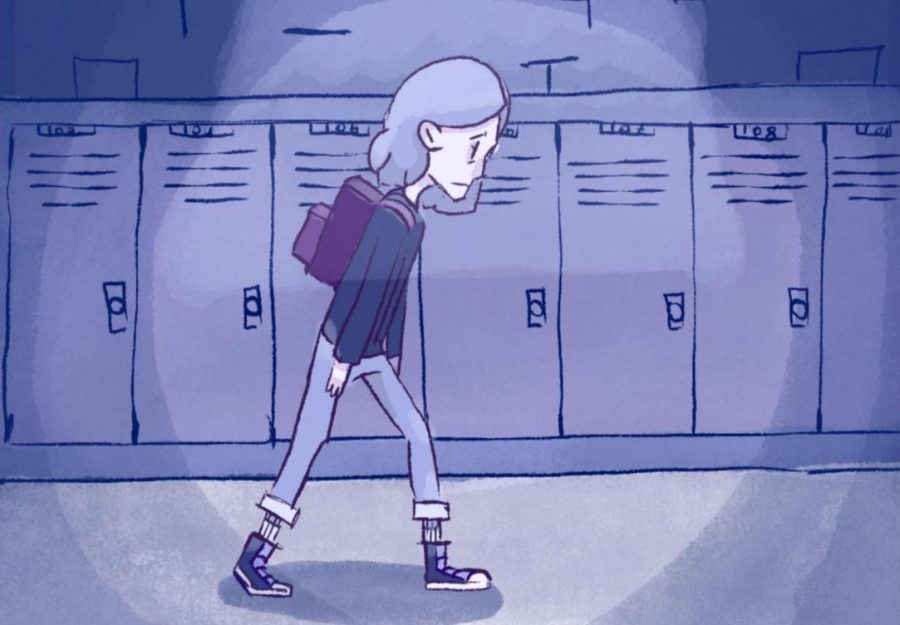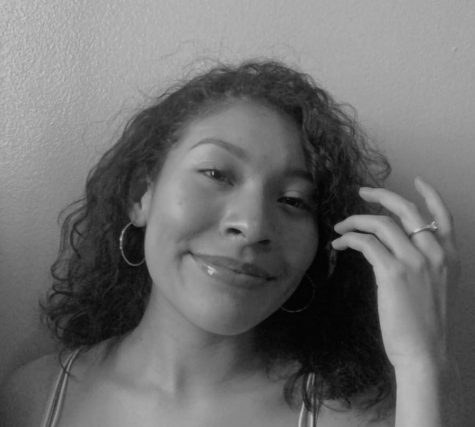13 Reasons Why: Problematic Entertainment?
This report debates the issue whether or not the show 13 Reasons Why is as controversial as people make it out to be or just another form of entertainment.
13 Reasons Why Art representing distressed student
October 8, 2019
In early 2017, the teen drama show 13 Reasons Why was released onto Netflix, and encountered backlash about the topics and graphic scenes the show portrayed. It left many viewers angry for how the graphic scenes were depicted, but others argued that the show helped start a conversation when it comes to suicide, assault, and rape.
“Season 1 wasn’t that bad until the scene where Hannah got raped and her suicide,” Sarah Schuh 21’ said. “The first few episodes were ‘normal’ high school drama with the new girl, the jocks, the cheerleaders, and the outcasts.”
Carlos Oliva 21’ believes the show had potential and enjoyed the plot concept and how each episode played out. Many saw this show as fiction.
“The first thing I would say about the series is that it is a work of fiction, based on a YA novel,” said Mrs. Collen. “Even though it contains a lot of real-life issues, it is still a Netflix show and is meant to entertain and shock.”
The show is deep with its topics, but everyone can relate to it in a way, believes Kayli Voudhivong 21.’It gives people a perspective they might not think about.
With the release of season 2 in the middle of 2018, fans of the show were met with disappointment with the direction that the show went. Many believe the season was unnecessary, and rather boring.. Nevertheless, there were the few hardcore fans that continued to be hooked on the show even seeing it as more of an opportunity to continue the conversation of sexual assault.
“Some of the topics they covered in season 1 stayed in season 1, but the topic like sexual abuse went on. That’s a pretty serious topic. t gives you both sides of the story that you wouldn’t necessarily think about,” said Voudhivong.
Seeing how graphic the first season was, many were hesitant about the release of season 2. Schuh believes everything and everyone was so messed up in the first season. The more gruesome scenes disgusted her like Hannahs’s suicide and Tyler being raped, but she found herself being hooked back in.
Season 1 of the show was taken very seriously to many viewers with different perspectives. From those who dealt with or have known someone who has faced these issues, they didn’t take the show lightly.
Some high schoolers may have experiences like that, but not to the extreme levels the TV show plays out. The TV show says that it happens every day, but I don’t think it happens daily or to that extreme,” said Oliva.
Many believe that the show doesn’t accurately represent how high schoolers actually are, especially now our highschool. However, this isn’t meant to dismiss those who have actually faced similar issues, but is meant not to confuse a work of fiction with reality.
“Based on my work at City High and having only watched season one of 13 Reasons Why, I’d say that many of the issues are realistic, but the experiences are sensationalized. Though, it’s meant to be a work of fiction, not a documentary. They want an audience and a lot of buzzes, and by sensationalizing the lives of teens and the issues they face, they achieved that goal,” said Mrs. Collen.
The main controversy surrounding the first season was the graphic scenes of Hannah committing suicide. That had people arguing that the scenes portrayed could give teens an idea to attempt suicide. This was seen again in season 2 with Tyler getting raped in the bathroom. That left many feeling uncomfortable with how long the scene played out, but others beg to differ.
The main concepts of the first season focused on suicide, rape, and the tapes. With these concepts, Voudhivong believes it had many talking about the show, from all kinds of perspectives.
“The positive side of the show is that it opened up a discussion about suicide and other issues teens face that may not have been happening. There is a myth that talking about suicide will encourage a person to attempt suicide. In reality, talking about suicide provides an opportunity for communication. Fears shared are more likely to diminish and having open conversations about suicide, even not feeling suicidal, let’s everyone know that it’s ok to share their feelings and ask for help”, argues Mrs. Collen.
Once season 2 came out many wondered whether it was even necessary to continue the conversation surrounding suicide as Season 1 ended with a satisfying conclusion. On the contrary, season 2 seemed like a mess bunched together that almost had no real purpose.
”Season 1 [alone] would’ve been good enough because we found out everything that happened with Hannah and her tapes/suicide. We didn’t really need to know what happened after that,” said Schuh.
The same question was asked once season 3 aired August 23rd, that changed the focus to Hannah to instead on her rapist Bryce Walker. This season had more of a murder mystery vibe while still mixing in the issues of rape from the previous seasons. Throughout the season, Bryce goes through hardships of losing people in his life because of the horrible things he did to the girls.Viewers almost get a sense of sympathy for him, but then remembering why he’s in the mess in the first place.
“For a little bit I did feel bad. I didn’t really feel people were listening to his side and I know what he did was very wrong but it was his turn to speak and tell everyone why he did what he did. I think that if people were to listen to what he has to say things wouldn’t have turned out the way they did.” said Voudhivong.
With all 3 Seasons of the show concluded some viewers were satisfied with how it all ended while others were still arguing over the topics portrayed since Season 1. This show gave many the opportunity to start a conversation about the main concepts of the show but at the end of the day, that’s all it is; a show. For those who continue to be upset with the show should remember that it isn’t meant to harm or influence viewers but instead to entertain and leave viewers on the edges of their seats for what is to happen in the next episode.

































